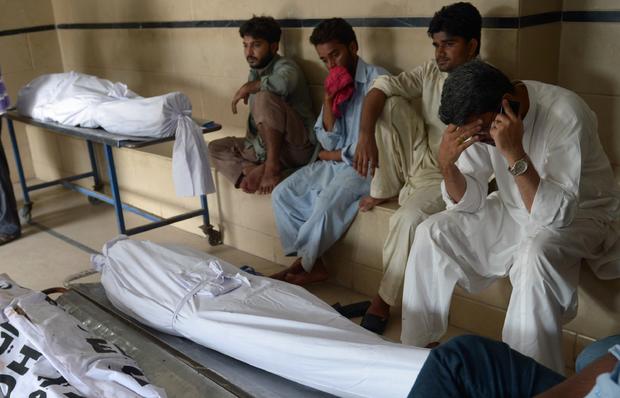Death toll from Pakistan heat wave soars past 600
KARACHI, Pakistan - A senior Pakistani health official says the death toll in the country's southern Sindh province, which has been struck by a heat wave, has reached 622.
Senior provincial health official Saeed Mangnejo said on Tuesday that he expects the number of fatalities to climb further.
Mangnejo says the death toll is for the past three days, though most of the deaths were reported in the province's largest city, Karachi.
Temperatures reaching 45 degrees Celsius (113 degrees Fahrenheit) struck Karachi over the weekend. Hourslong power outages, typical in Pakistan, also struck the city, leaving fans and air conditioners inoperable as the majority of people in this Muslim country abstain from food or water in daylight hours during the holy fasting month of Ramadan.
Morgues have overflowed with the dead and hospitals have struggled to aid those clinging to life.
The power outages also affected the sporadic water supply in the city, where those who can afford it rely on tankers of water being delivered to their homes.
Most of the dead are the elderly, said Seemi Jamali, a spokeswoman for Karachi's Jinnah Hospital. Thousands more are being treated for heat-related ailments, including fever and dehydration and stomach-related illnesses, she said. Mortuaries were running out of space, with local television stations showing bodies stacked inside of cold storage rooms of morgues.
Many arrive at the hospital already unconscious or staring out blankly. Some fainted in hospital doorways, while patients lay on public benches and crowded corridors in wheelchairs and stretchers. Panicked families fought with hospital staff to admit their loved ones.
"We're dying and we're being told to wait," said Moazzam Ali, as two women comforted his badly dehydrated mother, who was waiting for medical care.
Provincial Chief Minister Qaim Ali Shah ordered schools and public offices closed Tuesday until the heat wave ends. He blamed Pakistani federal government for the deaths, saying they didn't respond to his appeals to fix the power grid. Abid Sher Ali, a junior minister for water and power for the federal government, in turn blamed Karachi's government for the deaths, saying they couldn't manage their own affairs.
Meteorologist Abdur Rauf called the heat wave the worst in at least a decade to strike Pakistan. He said expected monsoon rains in the coming days likely will bring relief to the area.
But for the time being, Karachi boils. Angry mobs protesting the power outages and having no water blockaded several roads, burning tires. Police official Aslam Khan said there was no violence, though he called it an "anarchy-like situation" in some neighborhoods.
Karachi's residents tried to find running water to cool off at public taps or broken pipes. Some bathed with their clothes on, while others washed their hands, faces and heads. As power outages rolled across the city, women and children walked down roads looking for shelter after leaving their small, suffocatingly hot homes.
Some expressed shock at how bad it had gotten.
"It seems as if there's no government," said businessman Salamat Hussain.
